 Paul Kupperberg’s I Never Write for the Money… But I Always Turn in the Manuscript for a Check is on Kickstarter now! After writing about 1,400 stories for DC Comics, Archie, Bongo Comics, Marvel, Charlton, and other publishers, not to mention editing hundreds more during his 16 years as an editor for DC Comics, one of the few things he does know is how to write a comic book story.
Paul Kupperberg’s I Never Write for the Money… But I Always Turn in the Manuscript for a Check is on Kickstarter now! After writing about 1,400 stories for DC Comics, Archie, Bongo Comics, Marvel, Charlton, and other publishers, not to mention editing hundreds more during his 16 years as an editor for DC Comics, one of the few things he does know is how to write a comic book story.
First Comics News: Paul, the title is I Never Write for the Money… But I Always Turn in the Manuscript for a Check what does the mean?
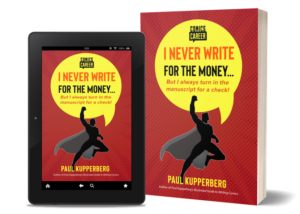 Paul Kupperberg: It started out as something I would say jokingly, but over time I realized there was a lot of truth in it. You know, as a freelancer, you’re always taking on all sorts of different assignments from a wide variety of clients and, and the amount you’re paid depends on what you write and who you write it for. Sometimes the payment offered is low — ridiculously low even, compared to what the majors pay — but if you accept the rate and take the job, you owe it to your client and readers to deliver the best possible work you can. There’s no such thing, in my mind, of prorating your work: “These guys pay $100 a page so I’m going to give it my best” versus “These guys only pay $15 a page so I can hack it out.” In the end, the reader doesn’t know what you’ve been paid for a story, just what they read on the page. That’s all they have to go on, what they’re reading. If a story is crap, they’re not going to think, “Well, they only paid Kupperberg $15 a page so he gave then 15 bucks worth of story.” They don’t know what I was paid, just that they’re reading a crappy story with my name on it. Hence, the title, which was a line I used in in several of the essays in the book: do your best on every job, like you were being paid top dollar in your field… but, oh yeah, make sure there’s a check waiting for you at the end of the job.
Paul Kupperberg: It started out as something I would say jokingly, but over time I realized there was a lot of truth in it. You know, as a freelancer, you’re always taking on all sorts of different assignments from a wide variety of clients and, and the amount you’re paid depends on what you write and who you write it for. Sometimes the payment offered is low — ridiculously low even, compared to what the majors pay — but if you accept the rate and take the job, you owe it to your client and readers to deliver the best possible work you can. There’s no such thing, in my mind, of prorating your work: “These guys pay $100 a page so I’m going to give it my best” versus “These guys only pay $15 a page so I can hack it out.” In the end, the reader doesn’t know what you’ve been paid for a story, just what they read on the page. That’s all they have to go on, what they’re reading. If a story is crap, they’re not going to think, “Well, they only paid Kupperberg $15 a page so he gave then 15 bucks worth of story.” They don’t know what I was paid, just that they’re reading a crappy story with my name on it. Hence, the title, which was a line I used in in several of the essays in the book: do your best on every job, like you were being paid top dollar in your field… but, oh yeah, make sure there’s a check waiting for you at the end of the job.
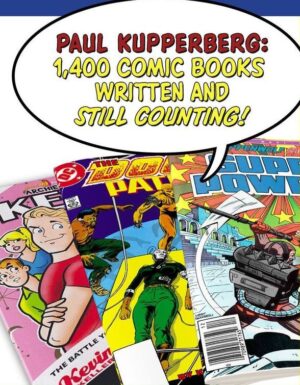 1st: How many comics have you written?
1st: How many comics have you written?
Paul: Lots. Somewhere around 1,400 or so.
1st: So, you would have been happy to write all of them for free?
Paul: I doubt it… but even if I had, without someone handing me a check at the end for whatever our agreed upon price was, those stories never would have seen print. I’m not advocating working for free, just that you make the writing your primary focus while you’re writing. The time to worry about business is before you start writing and after you’ve finished.
1st: How much of the book is republished material? Where did it come from? What is new?
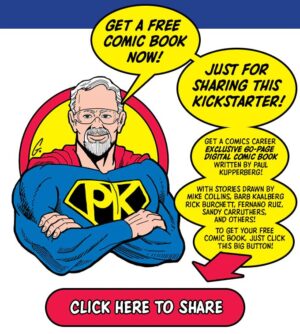 Paul: All of the columns and essays in the book are reprinted from a variety of online sources from over the past 10 years or so, including the columns I did on writing that originally appeared on Kirk Chritton’s ComicsCareer.com, as well as blog posts and essays that I wrote for Crazy8Press.com, the publishing hub I’m part of with Peter David, Bob Greenberger, Mary Fan, and several other writers, and my website, PaulKupperberg.com. The subtitle of the book is “Essays on Writing and its Aftermath,” so it’s not only about writing — the process of which I cover in detail in my previous book, Paul Kupperberg’s Illustrated Guide to Writing Comics (Charlton Neo Press, 2020) — but it’s also about having written, learning firsthand how your stories impacted an audience, how artists see themselves and their work, and the world of publishing, as I see it, in general. I also ramble on about my POV of the current state of the industry and how I fit into it. Or not. All the pieces in the book have been revised and updated, and it also includes, along with profuse, or maybe semi-profuse, illustrations, a career-spanning interview with me conducted by Comics Career publisher Kirk Chritton.
Paul: All of the columns and essays in the book are reprinted from a variety of online sources from over the past 10 years or so, including the columns I did on writing that originally appeared on Kirk Chritton’s ComicsCareer.com, as well as blog posts and essays that I wrote for Crazy8Press.com, the publishing hub I’m part of with Peter David, Bob Greenberger, Mary Fan, and several other writers, and my website, PaulKupperberg.com. The subtitle of the book is “Essays on Writing and its Aftermath,” so it’s not only about writing — the process of which I cover in detail in my previous book, Paul Kupperberg’s Illustrated Guide to Writing Comics (Charlton Neo Press, 2020) — but it’s also about having written, learning firsthand how your stories impacted an audience, how artists see themselves and their work, and the world of publishing, as I see it, in general. I also ramble on about my POV of the current state of the industry and how I fit into it. Or not. All the pieces in the book have been revised and updated, and it also includes, along with profuse, or maybe semi-profuse, illustrations, a career-spanning interview with me conducted by Comics Career publisher Kirk Chritton.
1st: Who is the target audience?
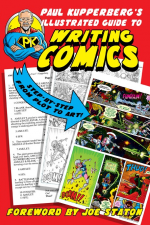 Paul: I asked myself the same question when Kirk first approached me about putting those ComicsCareer.com columns into print. I had cannibalized some of the pieces for the recently published Illustrated Guide to Writing Comics, which I figured pretty much covered my thoughts on the topic. But when I took another look at them, I saw they were really more about the process than the mechanics of writing, and that collected with these other essays they made sense as a sort of professional autobiography. I don’t know, maybe the target audience is people who don’t want to make the same mistakes I’ve made.
Paul: I asked myself the same question when Kirk first approached me about putting those ComicsCareer.com columns into print. I had cannibalized some of the pieces for the recently published Illustrated Guide to Writing Comics, which I figured pretty much covered my thoughts on the topic. But when I took another look at them, I saw they were really more about the process than the mechanics of writing, and that collected with these other essays they made sense as a sort of professional autobiography. I don’t know, maybe the target audience is people who don’t want to make the same mistakes I’ve made.
1st: What changes have you seen in the publishing industry over the last decade?
Paul: Where to begin? I started writing for DC in 1975, a far more innocent time of comic book storytelling. Stories were still only a decade past the goofy Jack Schiff Batman vs. monsters and aliens and the adolescent Superman trying to hide his secret identity from nosey Lois Lane Mort Weisinger-edited stories. Even in 1984, a Superman vs. Toyman story that I pitched was reshaped by editor Julie Schwartz into “The Great Toyman Trivia Contest,” about Toyman’s sneaky scheme to take revenge against his bullying childhood nemesis. Maybe you could get away with a story like that in an all-ages or kids comic today, maybe, but in 1984, it was the cover story in Action Comics, DC’s flagship title. I grew up with comics that, really, were only for kids. It’s a whole other market now.
And when I started, it was still the horse and buggy era of publishing, the “hard copy” era, because everything we did was done as a physical process. Stories were written on typewriters, typed manuscripts were edited with a pencil, type was set either by hand or machines that produced a strip of type on photographic paper that was placed by hand and glue to a page, and so on. By the time I left staff at DC in 2006, I could do entire projects where I never had to touch a physical piece of art or copy; it was all done electronically, right down to the final processed and formatted image from which the comic or book was printed.
1st: Are these changes for the better?
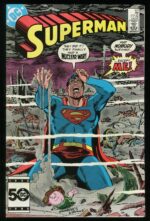 Paul: Creatively, who can say? The majors seem to be chasing a continually changing and diminishing audience and marketplace… I mean, I recently found some old royalty statements and while I don’t have the numbers on that Toyman story, I do have them for Superman #408 which I wrote the following year: sales of 101,545. Admittedly, that issue had a far more dramatic cover and theme than the Toyman story, but the latest numbers I can find for those titles today, from March of this year, put Action at about 38,000 and Superman at 34,000. And that’s with Brian Bendis, one of the most popular writers in the business, on at least one of them. The number one bestselling book that month, Marvel’s Spider-Woman #1, sold 142,089 copies; in 1987, my Doom Patrol #1 did 221,527, and I’m pretty damn sure that it wasn’t even DC’s top selling book that month.
Paul: Creatively, who can say? The majors seem to be chasing a continually changing and diminishing audience and marketplace… I mean, I recently found some old royalty statements and while I don’t have the numbers on that Toyman story, I do have them for Superman #408 which I wrote the following year: sales of 101,545. Admittedly, that issue had a far more dramatic cover and theme than the Toyman story, but the latest numbers I can find for those titles today, from March of this year, put Action at about 38,000 and Superman at 34,000. And that’s with Brian Bendis, one of the most popular writers in the business, on at least one of them. The number one bestselling book that month, Marvel’s Spider-Woman #1, sold 142,089 copies; in 1987, my Doom Patrol #1 did 221,527, and I’m pretty damn sure that it wasn’t even DC’s top selling book that month.
On the business end, publishing, comics and books, have taken on a Hollywood mentality, which makes perfect sense since most of the major publishers of both are probably a subsidiary of one studio or another. New is good, old is bad. What they don’t seem to realize, or care about, is that old is also experience, and it doesn’t mean the end of creativity. I know an A-level writer in his 50s who a couple of years ago told me that he’d begun dying his hair for any meetings and public appearances for fear the gray in it reminded anyone of his age. He’s got every reason to worry that those gray hairs could be Green Kryptonite to his career. That Hollywood mentality also comes into play in book publishing with the obsession for every title to be a blockbuster or bestseller. There used to be a category in publishing called the mid-list, full of books written by little known bread-and-butter writers, like me. But it takes books by 500 of me to earn as much as one book by Stephen King or Michael Connelly, so why should a publisher take the time or expense to publish 500 books by 500 authors when one J.K. Rowling will suffice?
As for the democratization of the publishing process… hip, hip, hoo-freakin’-ray! When I got the first copies of my mystery novel, The Same Old Story from the printer, I gave my son, who was about 14 at the time, a copy. He looked it over, flipped through it, and said, with some surprise, “It looks like a real book.” Yes! Because it is a real book! It doesn’t have to say Simon and Schuster or Random House on the spine anymore.
1st: How do you fit into this changing industry?
Paul: I’m not sure that I still do, to tell you the truth. But I’m still in there trying, at least until everybody tells me to go away.
 1st: What is the Kupperberg Kickstarter Comics Sampler?
1st: What is the Kupperberg Kickstarter Comics Sampler?
Paul: A collection of eight comic book stories written by me, mostly for various Charlton Neo Comics projects, that we’ve collected into a free 60-page digital comic book that is downloadable just for visiting the I Never Write for the Money Kickstarter page and sharing the news on Facebook… no purchase, as they, necessary! The stories feature art by Mike Collins, Rick Burchett, Fernando Ruiz, Sandy Carruthers, Andrew Mitchell, Pat & Tim Kennedy, Mort Todd, Bob Smith, Barbara Kaalberg, and, from TrolLords, a 1987 black & white indie comic, a story illustrated by recent Primetime Emmy Award nominee, the fabulous and lovely Stephen DeStefano.
 1st: What is Jew-Jitsu: The Hebrew Hands of Fury?
1st: What is Jew-Jitsu: The Hebrew Hands of Fury?
Paul: Jew-Jitsu: The Hebrew Hands of Fury is the only book of self-defense you’ll need this or any other High Holy Days season! It’s also going to be the $4,000 Stretch Goal as a digital edition featuring a new cover by artist Daerick Gross Sr. Jew-Jitsu: The Hebrew Hands of Fury is a humor book about the history and techniques of the Jewish/Japanese hybrid art of self-defense (think of it as gefilte fish meets sushi) originally published in paperback by Kensington Publishing in 2009. It’s illustrated and contains a Yiddish glossary, so you should know what we’re talking about!
1st: What other add-ons do you have?
Paul: Books! In addition to I Never Write for the Money… But I Always Turn in the Manuscript for a Check, we’re also offering at various levels more books, including the first Comics Career book, Tales from the Titans, the best of Comics Career interviews, edited by Kirk Chritton, wit top creators and editors including: Dave McKean (Sandman), Derf Backderf (My Friend Dahmer), Kerry Callen (MAD Magazine), Dick Giordano (Batman, DC Comics Executive Editor), Tom DeFalco (Spider-Man, Marvel Comics Editor-in-Chief) and best-selling crime novelist Alex Grecian. We’re also offering print and digital copies of some of my earlier books, including Paul Kupperberg’s Illustrated Guide to Writing Comics and The Unpublished Comic Book Scripts of Paul Kupperberg (containing the five scripts left unpublished by the pre-Crisis cancellation of Supergirl and New Adventures of Superboy), plus bookmarks, signed comics and scripts from me and Comics Career swag from Kirk. We’ve already hit the first stretch goal, the “Thank You” Backers Page… for as little as $1, we’ll list you as a backer in gen-u-ine alphabetical order! Goal #2 will be a digital copy of Jew-Jitsu, and, if we make it there, we’ll unveil the special 200-plus page ebook Stretch Reward waiting in the wings.
1st: What is the minimum pledge for a digital copy?
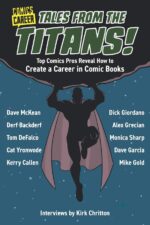 Paul: A digital copy can be had at the $5 level ($10 if you also want Tales from the Titans).
Paul: A digital copy can be had at the $5 level ($10 if you also want Tales from the Titans).
1st: What is the minimum pledge for a print copy?
Paul: Minimum for a print copy is $25, but that also includes the digital editions of my book and Tales from the Titans and a bookmark.
1st: What makes I Never Write for the Money… But I Always Turn in the Manuscript for a Check so cool no true comic fan should miss it?
Paul: I like to think I Never Write for the Money is for people like watching old men standing on the lawn shouting at the clouds. Also, I figure since I’m still learning new ways to do the thing that I do better, maybe I’ve still got a few things to teach. That’s gotta be worth dropping five bucks on, right?
